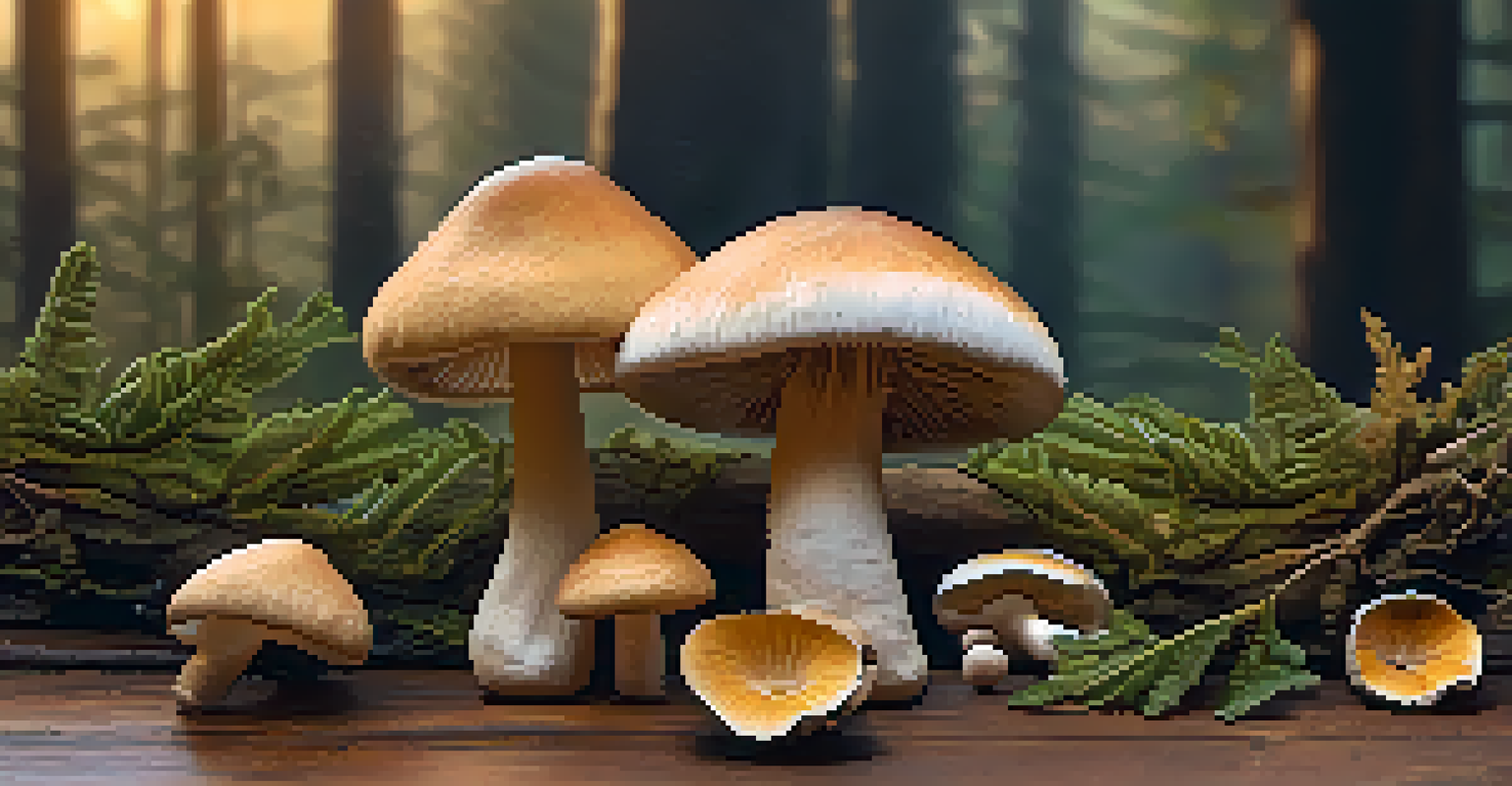Mushrooms and Mental Health: A Clinical Perspective

Understanding Mushrooms and Their Components
Mushrooms are not just culinary delights; they contain bioactive compounds that may influence mental health. Some varieties, like psilocybin mushrooms, have gained attention in recent years for their potential therapeutic effects. These compounds interact with the brain's serotonin receptors, which play a crucial role in mood regulation.
Mushrooms are the most important medicine in the world. They are the missing link to our health and well-being.
Research indicates that psilocybin can lead to profound changes in perception and mood, often described as 'mystical experiences.' Such experiences may help individuals confront their emotions and gain new insights into their mental health challenges. This unique interaction makes mushrooms a fascinating area of study in psychology and psychiatry.
Additionally, other mushroom species, such as Lion's Mane, have shown promise in preliminary studies for enhancing cognitive function and reducing anxiety. Understanding these components is essential as we explore the broader implications of mushrooms on mental health.
The Role of Psilocybin in Treating Mental Health Disorders
Psilocybin has emerged as a potential treatment for various mental health disorders, including depression, anxiety, and PTSD. Clinical trials have demonstrated significant reductions in symptoms for participants receiving psilocybin therapy compared to those on traditional medications. This has sparked a new wave of interest in the therapeutic applications of psychedelics.

One of the key advantages of psilocybin is its ability to facilitate deep emotional processing. Patients often report feeling a sense of relief or release from their mental burdens during sessions. This experience can lead to lasting changes in perspective, which is a crucial aspect of effective therapy.
Psilocybin's Therapeutic Potential
Psilocybin shows promise in treating mental health disorders like depression and PTSD, with significant symptom reductions reported in clinical trials.
However, it's important to note that psilocybin therapy is most effective when guided by trained professionals. This ensures a safe environment where individuals can explore their thoughts and emotions without fear. As research continues, the clinical community is becoming increasingly optimistic about its potential.
Lion's Mane: A Mushroom for Cognitive Health
Lion's Mane is another mushroom that has gained traction for its potential mental health benefits. Unlike psilocybin, Lion's Mane is non-psychoactive, making it more accessible for those hesitant about psychedelic experiences. Studies suggest that this mushroom may promote nerve growth factor (NGF) synthesis, which is vital for brain health.
Psychedelics, including psilocybin, can provide a unique opportunity to explore the depths of the human mind and psyche.
Preliminary research has indicated that Lion's Mane may help improve memory and cognitive function, making it a popular supplement among those looking to enhance their mental clarity. Additionally, it has been linked to reduced symptoms of anxiety and depression in some studies, although more research is needed to solidify these claims.
Incorporating Lion's Mane into your diet can be as simple as adding it to meals or taking it in supplement form. However, it's always best to consult with a healthcare professional before adding any new supplement to your routine, especially for mental health purposes.
The Science Behind Mushrooms and Mental Health
The science of how mushrooms affect mental health is still developing, with researchers exploring various mechanisms. One key area of interest is the gut-brain axis, which highlights the connection between gut health and mental well-being. Certain mushrooms may positively influence gut microbiota, which in turn can affect mood and cognition.
Moreover, the anti-inflammatory properties of some mushrooms are being studied for their potential to alleviate mental health disorders. Chronic inflammation is increasingly recognized as a contributing factor to conditions like depression. By reducing inflammation, mushrooms could play a role in improving overall mental health.
Lion's Mane Supports Cognitive Health
Lion's Mane mushroom is linked to improved memory and cognitive function, making it a popular choice for enhancing mental clarity.
As more studies are conducted, we are likely to gain a clearer understanding of how these natural substances can be harnessed in clinical settings. This ongoing research could pave the way for innovative treatments that prioritize holistic approaches to mental well-being.
Potential Risks and Considerations
While mushrooms offer promising benefits, it's essential to approach their use with caution. Psychedelic mushrooms like psilocybin can provoke intense experiences that may not be suitable for everyone. Individuals with a personal or family history of mental illness should tread carefully, as these experiences can sometimes exacerbate underlying conditions.
Additionally, the legality of psilocybin varies greatly across regions, which can complicate access for those interested in exploring its therapeutic potential. It's crucial to stay informed about local laws and engage with qualified practitioners if considering psilocybin therapy.
On the other hand, non-psychoactive mushrooms like Lion's Mane are generally considered safe but should still be used mindfully. Consulting with a healthcare provider can help ensure that any supplement or treatment aligns with individual health needs.
Integrating Mushrooms into Mental Health Practices
As the therapeutic applications of mushrooms become more recognized, integrating them into mental health practices is gaining traction. Some therapists are beginning to incorporate psychedelics into their treatment plans, offering patients a holistic approach to recovery. This integration can enhance traditional therapies and provide patients with new tools for coping.
Practitioners emphasize the importance of creating a supportive environment during sessions involving psilocybin. This setting can significantly impact the overall experience and outcomes for patients. Furthermore, combining mushrooms with other therapeutic practices, such as mindfulness and talk therapy, may amplify their benefits.
Caution with Mushroom Use
While mushrooms can offer mental health benefits, it's essential to approach their use carefully, especially with psychedelic varieties like psilocybin.
For those interested in exploring this integration, it's vital to seek out licensed professionals who are experienced in psychedelic therapies. This ensures a safe and effective approach to mental health treatment, allowing individuals to tap into the potential benefits of mushrooms responsibly.
The Future of Mushrooms in Mental Health Research
The future of mushrooms in mental health research looks promising, with numerous studies underway exploring various mushrooms' therapeutic effects. As societal attitudes shift toward more open-minded views of psychedelics, funding and interest in this field are expected to grow. This could lead to breakthroughs in understanding how mushrooms can be utilized effectively.
Emerging research is focusing on the long-term effects of psilocybin therapy, particularly regarding its potential to create lasting changes in neural pathways. Understanding these mechanisms could revolutionize the way we approach mental health treatment, moving away from traditional pharmaceuticals toward more natural options.

As we look ahead, collaborations between researchers, healthcare providers, and policymakers will be crucial in shaping the future of mushrooms in mental health. By prioritizing safety and scientific rigor, we can harness the potential of these remarkable fungi to improve mental well-being on a broader scale.